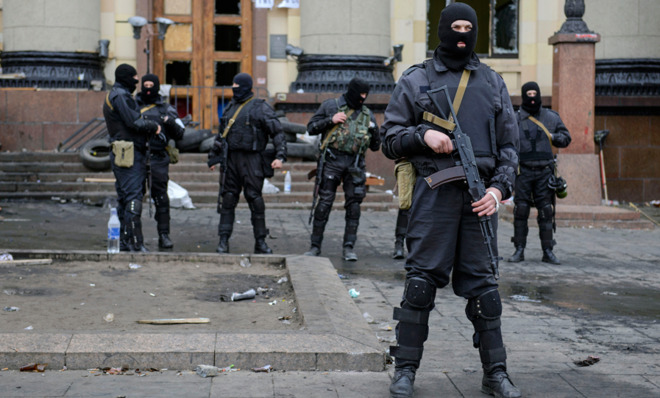Russia masters the art of clandestine warfare against Ukraine


A free daily email with the biggest news stories of the day – and the best features from TheWeek.com
You are now subscribed
Your newsletter sign-up was successful
Don't be surprised that Russian special forces and military intelligence are stirring up resistance in eastern Ukraine. When acute conflicts seem to simmer, Americans lull themselves into a false nap of security. It's false because Vladimir Putin's timeline is significantly longer than ours. We care about the Crimea, today, or what happens in Ukraine, tomorrow. Putin has the luxury of time; he cares what happens next year.
The "resistance" is artificial, of course. People power in the late 20th and early 21st centuries has been generated more often than not by foreign governments that have their own agendas, and not by indigenous forces. The U.S. national security establishment understands this, because they designed the template the Russians are using. From the first CIA officers who toppled Mohammed Mossagdeh in 1953, to clandestine efforts to prop up and then discredit Asian governments during the Kennedy administration, to the Cuban exiles trained by the CIA to overthrow Fidel Castro, to efforts to overthrow the Taliban in Afghanistan after the September 11th terrorist attacks, to the "indigenous" American-backed Iraqis who took control after the war — the playbook is very familiar.
First in are the blackest of the black: case officers for the intelligence community who operate without official cover, who recruit sources and assess the battlefield. Then, small units of special operations forces sneak in, sometimes blending in with the populace, ready to make trouble. Then, special forces units that specialize in "information operations" designed to induce anxiety and outrage among local populations follow a strategy that comes from the top of the government. The idea is to generate genuine indigenous protest movements. Vladimir Putin has an eye to history; if today he seeds the strands that bind ethnic Russians in Ukraine together, it doesn't matter whether it takes five months or five years for a revolution to foment.
The Week
Escape your echo chamber. Get the facts behind the news, plus analysis from multiple perspectives.

Sign up for The Week's Free Newsletters
From our morning news briefing to a weekly Good News Newsletter, get the best of The Week delivered directly to your inbox.
From our morning news briefing to a weekly Good News Newsletter, get the best of The Week delivered directly to your inbox.
Special operations forces are clandestine. Their presence is deniable. Often they operate as mercenaries for hire, or contractors. (This should sound familiar.) Their activities are not covert because they are designed to grab attention. The hallmarks of non-linear warfare are operational confusion, mistaken identity, and a sense of brittleness and crisis. Eventually, the combination of agents provocateurs and real protesters blend together.
In Ukraine, Putin has already won that war.
CNN calls the events of the past week "pro-Moscow uprisings." Pro-Moscow? Yes. Uprisings? More like artificially-generated-but-genuinely-sustained efforts to create civil war in eastern Ukraine.
John Kerry, the secretary of State, castigated Russia for its "19th century behavior." But Russia has actually mastered psychological warfare, a 21st-century art, and is using 21st-century tools to wage its campaign. It is, of course, easier to identify clandestine intelligence agents and special forces in the age of camera phones. If you wonder why Russia hasn't taken more steps to conceal its involvement, you have again fallen prey to the time-horizons fallacy. They're in this for the long haul.
A free daily email with the biggest news stories of the day – and the best features from TheWeek.com
Marc Ambinder is TheWeek.com's editor-at-large. He is the author, with D.B. Grady, of The Command and Deep State: Inside the Government Secrecy Industry. Marc is also a contributing editor for The Atlantic and GQ. Formerly, he served as White House correspondent for National Journal, chief political consultant for CBS News, and politics editor at The Atlantic. Marc is a 2001 graduate of Harvard. He is married to Michael Park, a corporate strategy consultant, and lives in Los Angeles.
-
 The ‘ravenous’ demand for Cornish minerals
The ‘ravenous’ demand for Cornish mineralsUnder the Radar Growing need for critical minerals to power tech has intensified ‘appetite’ for lithium, which could be a ‘huge boon’ for local economy
-
 Why are election experts taking Trump’s midterm threats seriously?
Why are election experts taking Trump’s midterm threats seriously?IN THE SPOTLIGHT As the president muses about polling place deployments and a centralized electoral system aimed at one-party control, lawmakers are taking this administration at its word
-
 ‘Restaurateurs have become millionaires’
‘Restaurateurs have become millionaires’Instant Opinion Opinion, comment and editorials of the day
